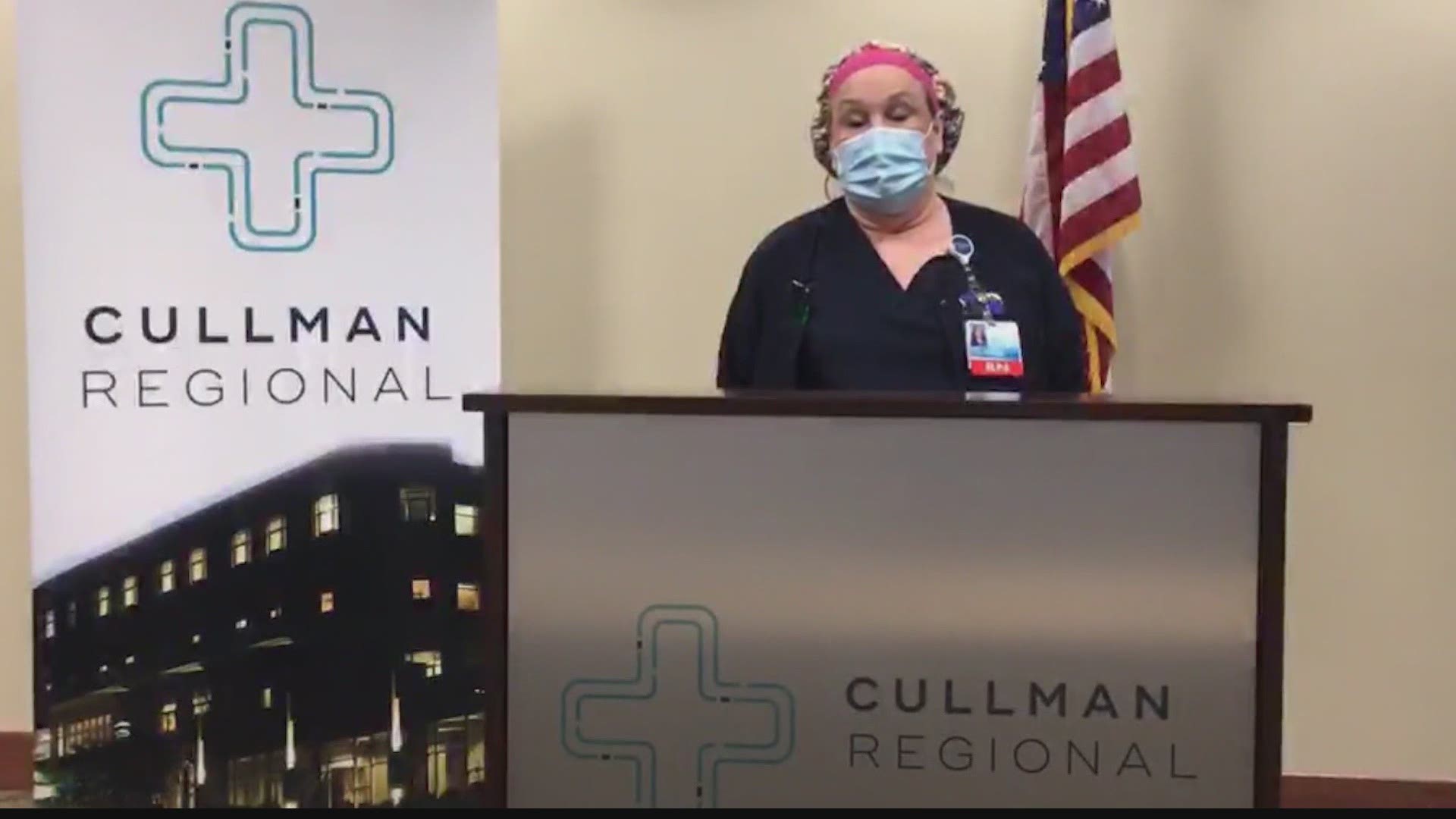CULLMAN, Ala. — The wait is over for at least one health care worker who's been on the frontlines of this pandemic. Cullman Regional administered its first Pfizer vaccine to one of their own.
"I was doing something instead of waiting for this virus to attack. I felt like I was attacking the virus," says Donna Snow, RN.
Snow has been a nurse for 42 years. She was the first health care worker at Cullman Regional to receive the Pfizer vaccine at 8:43 Tuesday morning.
"Donna was the first nurse to take care of the first COVID patient that we had on a ventilator in this hospital when this pandemic began," says Cullman Regional Chief Medical Officer, Dr. William Smith, MD.
Although side effects for receiving the vaccine can be different for everyone, Snow says so far so good.
"No, the vaccine does not hurt, and I took it a little after eight this morning. And my arm is not bothering me at all. I can't even tell that I've had anything done," says
Cullman Regional received a vaccine allocation of 1,950 doses. Half of those doses will go to hospital staff.
"Working on registering these people in the state database vaccinations so we have a good record of who has been vaccinated," says Smith.
The hospital has also set up a vaccination clinic for the frontline workers. However, there are some challenges with pulling that clinic together.
"Our ICU is at 140% capacity. Our hospital is almost full. Almost every bed is occupied. We're even having to delay some surgeries just because of our staffing," says Smith.
"We're not going to see anything right away. The numbers are going to be there when we wake up tomorrow, but eventually I'm very optimistic that things are going to get better," says Snow.
Cullman Regional administered its first COVID-19 vaccine to Critical Care Nurse Donna Snow, RN, at 8:43 a.m. on Tuesday, December 15.
“In following the federal and state-approved guidelines of vaccine administration, we are excited to report that one of our frontline critical care nurses was first to receive the COVID-19 vaccine at our facility,” Cullman Regional Chief Medical Officer William Smith, MD said.
The facility received an initial shipment of the Pfizer COVID-19 vaccine on Monday, December 14.
“Our team has been working diligently to get ready to administer these vaccinations to our team members upon receiving our allocation,” said Smith. “This preparation allowed us to begin administering them almost immediately after they were received.”
Snow, who received the vaccine, has been a registered nurse for 42 years and described the virus as "scary."
“The care required for these patients is challenging,” Snow said. “Not only do the clinical staff have to take more time to dress in the protective gear, but the care of the patients takes more time as well.”
Snow said that while some people may not be affected as harshly by the virus, they can spread it to those who will have to fight for their lives against it.
“I’m sick of hearing that it’s just like the flu; it’s not the flu,” said Snow.
The Centers for Disease Control and Prevention (CDC) has a plethora of information on how to protect yourself and other from the coronavirus.
The virus can easily spread from person to person, so the CDC recommends you stay at least 6-feet apart from people not in your household. The virus is spread through respiratory droplets that are produced when an infected person coughs, sneezes, breaths or talks, according to the CDC. Because of this, the CDC recommends you wear a cloth facemask when around others and in public.
Additionally, the CDC recommends that you frequently wash your hands with soap and water for at least 20 seconds.
Symptoms to look out for include fever or chills, cough, shortness of breath or difficulty breathing, fatigue, muscle or body aches, headache, new loss of taste or smell, a sore throat, congestion or runny nose, nausea or vomiting and diarrhea, according to the CDC.
Click here to find more COVID-19 information from the CDC.
If you suspect you have the coronavirus, you should seek out testing and self-quarantine.
Click here to find more COVID-19 information from the Alabama Department of Public Health.

